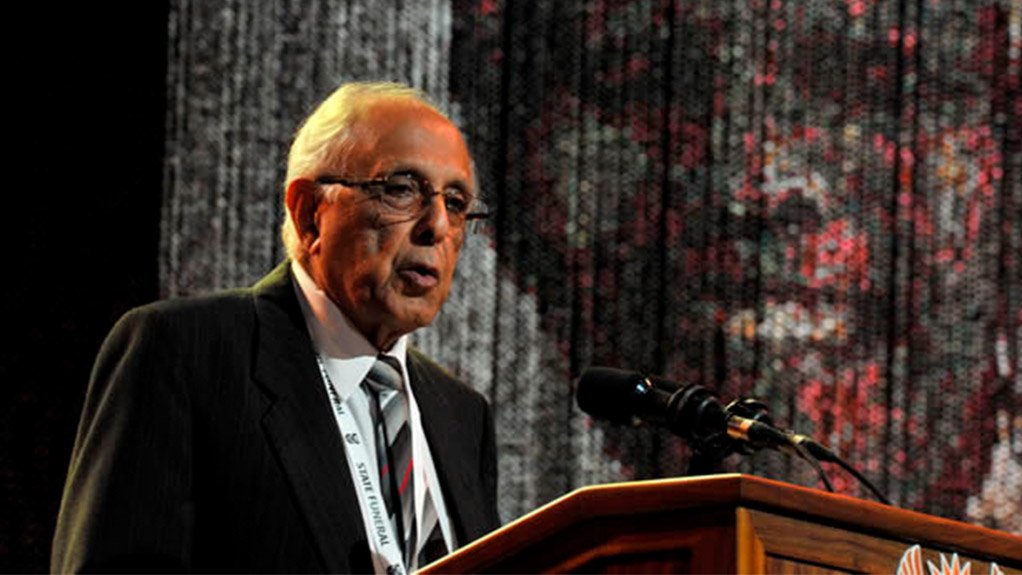/ MEDIA STATEMENT / The content on this page is not written by Polity.org.za, but is supplied by third parties. This content does not constitute news reporting by Polity.org.za.
Former Rivonia trialist and struggle veteran Ahmed Kathrada has died at the age of 87.
Kathrada was hospitalised on 4 March 2017 for surgery related to blood-clotting on the brain. The African National Congress (ANC) struggle stalwart died on Tuesday morning (28 March) after a short illness following the surgery.
Ahmed Mohamed “uncle Kathy” Kathrada was born on 21 August 1929, to Indian immigrant parents in Schweizer Reneke, a small town in Western Transvaal [now North West Province].
Kathrada’s political work began in 1941, at the early age of 12 when he joined the Young Communist League of South Africa, distributing leaflets at street corners for the League. During World War II, he was involved in the anti-war campaign of the Non-European United Front.
In the 1940s, Kathrada met ANC leaders, Walter Sisulu, Nelson Mandela, I.C. Meer and J.N. Singh.
At the age of 17, he left school to work full-time in the offices of the Transvaal Passive Resistance Council.
Kathrada participated in the Passive Resistance Campaign of the South African Indian Congress.
Kathrada was one of the 2,000 volunteers imprisoned in that campaign and served a month in a Durban jail along with other ardent resisters such as Dr. Monty Naicker, Dr. Yusuf Dadoo, Dr. Goonam, George Singh, Cissie Gool, M.D. Naidoo and others. This was his first jail sentence for civil disobedience.
Kathrada was a founding member of the Transvaal Indian Volunteer Corps and that of its successor, the Transvaal Indian Youth Congress.
In 1951, he enrolled as a student at the University of the Witwatersrand (Wits) but later abandoned his studies to devote himself full-time to political activism.
As the alliance between the African and South African Indian Congress (SAIC) developed, Kathrada came into closer contact with Nelson Mandela, Walter Sisulu, J.B. Marks and other African leaders.
The signing of the Dadoo-Naicker-Xuma Pact in 1947 strengthened the Alliance, which comprised the ANC and the SAIC.
Kathrada worked tirelessly to promote joint action as a leader of the Youth Action Committee, coordinating the youth wings of the African, Indian and other Congresses.
In 1952, he helped organise the ‘Campaign of Defiance against Unjust laws’, launched jointly by the ANC and the SAIC.
The Defiance Campaign targeted six unjust apartheid laws, among them being the Pass Laws, Stock Limitation Regulations, the Group Areas Act, the Separate Representation of Voters Act, the Suppression of Communism Act and the Bantu Authorities Act.
Kathrada was among a group of 20 officials who were charged with organising the Defiance Campaign jointly organised by the ANC and SAIC. They were given a suspended sentence of nine months with hard labour, which was suspended for two years.
In 1955, when Indian schools in Johannesburg were moved out of the city to the segregated location of Lenasia, some 22 miles away, he helped organise the Central Indian High School parents’ association. This served as a private school, established to combat the Group Areas Act, and he was duly elected as secretary.
In the same year, he helped organise the multi-racial “Congress of the People”, which proclaimed the “Freedom Charter”, a policy document of the Congress Alliance. Kathrada served on the Alliance’s General Purpose Committee.
In 1956, he was among the 156 Congress activists and leaders charged for High Treason. Kathrada, Mandela and Sisulu were among the last 30 to be acquitted. Despite constant harassment by the police, Kathrada nevertheless continued his political activities.
Kathrada was restricted to the Johannesburg area in 1957, and following the Sharpeville Massacre in 1960, he was detained for five months during the State of Emergency, after which the ANC and Pan Africanist Congress were banned.
In 1961, Kathrada was arrested for serving on a strike committee that opposed Prime Minister Hendrik Verwoerd’s plan to declare South Africa a Republic.
In July 1963, the police swooped on Liliesleaf Farm in Rivonia, a Johannesburg suburb where Kathrada and other “banned” persons had been meeting. This led to the famous “Rivonia Trial”, in which eight accused were sentenced to life imprisonment with hard labour.
Kathrada spent 26 years and 3 months in prison, 18 of which were on Robben Island. His fellow prisoners included ANC leaders such as Mandela, Sisulu, Govan Mbeki, Raymond Mhlaba, Denis Goldberg, Elias Motsoaledi and Andrew Mlangeni.
In 1982, Mandela, Sisulu, Kathrada, Mhlaba and Mlangeni were transferred to Pollsmoor Prison in Cape Town.
When Mandela died in December 2013, Kathrada said: “When Walter [Sisulu] died, I lost a father and now I have lost a brother. My life is in a void and I don’t know who to turn to”.
Kathrada is part of the generation of struggle stalwarts who made an indelible mark during the struggle for freedom and the building of democracy in South Africa.
EMAIL THIS ARTICLE SAVE THIS ARTICLE
To subscribe email subscriptions@creamermedia.co.za or click here
To advertise email advertising@creamermedia.co.za or click here











